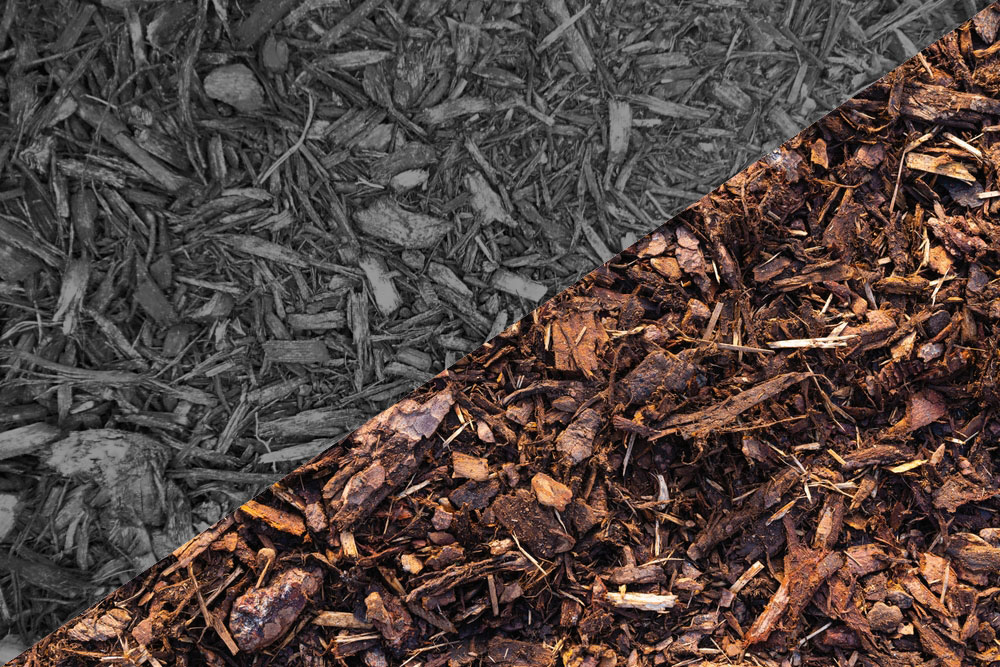If you’re considering mulch options for your landscape and are looking into darker hues to complement your design, you have a few good choices at your disposal. Two of the most common are black mulch and brown mulch – how do they differ, and which is right for your needs?
At BioGrass Sod Farms, we’re proud to offer a huge range of various mulch products to clients around Salt Lake City, including black mulch, dark brown mulch and more – and available in large bark nuggets, small bark nuggets and everything in between. Here are some of the basic areas where black and brown mulch are similar and different, plus some general tips on how to choose between them for your landscaping needs.
Purposes of Mulch
Before we get into some specific comparisons of black mulch and brown mulch, let’s first cover some of the general purposes for which you may use mulch in landscaping:
- Adding a decorative element to your landscape design.
- Insulating soil against temperature fluctuations.
- Retaining moisture in soil.
- Suppressing weed growth.
- Preventing erosion.
Essentially, these are all tasks where mulch is acting as a protective barrier for your soil. Now, let’s go over some of the qualities you’re looking for in your mulch, plus how black and brown mulch compare.
Both Are Dyed Formats
First, a basic note – both black and brown mulch are dyed formats. This means that they have a color added to them, rather than being purely natural colors like red or tan (which are achieved through the types of trees used in making the mulch). In most cases, the dyes used for these products are biodegradable and safe for plants and animals.
How They’re Made
When it comes to the base materials that are typically used to create them, black and brown mulch tend to be relatively similar. Both are created using shredded bark or wood chips from hardwood trees like oak, pine or cedar. In fact, it’s not uncommon for a single batch of mulch to produce both black and brown products – the only difference is the dye used.
Color Differences
The primary difference between black and brown mulch, unsurprisingly, is their color. Black mulch will have a much darker hue than brown mulch, which is typically a rich, dark brown color. Depending on the type of dye used, there may also be subtle variations within these general colors.
Heat Retention
One area where black mulch has a distinct advantage over brown mulch is in its heat retention abilities. The darker color of black mulch allows it to absorb more heat from the sun, which can be beneficial for plants that prefer warmer soil temperatures. On the other hand, if you live in an area with hot summers, this could mean that your soil will get too hot and potentially harm your plants.
Within this particular area, brown mulch is often preferred for areas with hot climates. It does a better job of insulating soil against extreme temperature fluctuations, keeping it cooler in the summer and warmer in the winter.
Weed Control
Both black and brown mulch are effective at suppressing weed growth – however, some gardeners swear by one over the other. Some believe that the darker color of black mulch helps to absorb and block more sunlight, making it more effective at preventing weed growth.
Others, however, argue that brown mulch is better for weed control because it breaks down more quickly and therefore adds nutrients to the soil, helping your plants grow stronger and outcompete any weeds.
Aesthetic
When it comes to purely aesthetic considerations, this will ultimately come down to personal preference. Some may prefer the bold contrast of black mulch against green plants, while others may prefer the more natural look of brown mulch. It’s important to consider your overall landscape design and choose a mulch color that complements it.
If most of your landscape is modern and sleek, black mulch may be a better fit. If you have a more traditional or rustic design, brown mulch may blend in more seamlessly.
Cost Factors
Another area where these two mulch types tend to be pretty similar is in terms of cost. Both black and brown mulch are widely available at a range of price points, so it’s important to shop around and compare prices before settling on one.
Ultimately, the best choice between black mulch and brown mulch will depend on your specific needs, preferences, and landscape design. Consider factors like heat retention, weed control, aesthetics, and cost when making your decision.
And remember, at BioGrass Sod Farms, we have a variety of mulch options available to meet any landscaping need you may have around SLC. Contact us today to learn more about these or our other landscaping products like topsoil, landscape rocks and more.
